Say it with electronux
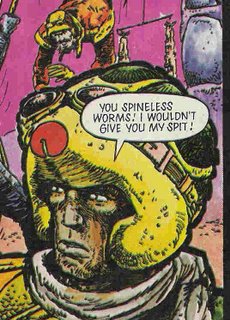
Johnny Alpha is a family man. Johnny Alpha looks after his own. Johnny Alpha hates it when the people he loves get hurt. Do not get him angry, or he will make his own laws.
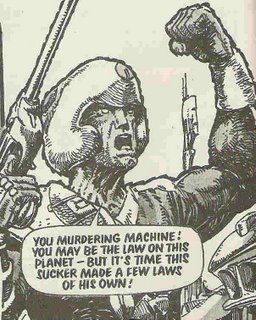 Long-time fans might have noticed that a number of these Strontium Dog scans come not from the pages of 2000 AD, but those of Star*Lord. The series made its debut in this short-lived comic, which merged with 2000 AD after a mere 22 issues. More on Star*Lord another time. Anyway, Strontium Dog hit its stride pretty quickly back in 1978, and soon established some key themes, foremost of which was without his helmet on, Alpha really looks like that guy from 'Clash of the Titans'
Long-time fans might have noticed that a number of these Strontium Dog scans come not from the pages of 2000 AD, but those of Star*Lord. The series made its debut in this short-lived comic, which merged with 2000 AD after a mere 22 issues. More on Star*Lord another time. Anyway, Strontium Dog hit its stride pretty quickly back in 1978, and soon established some key themes, foremost of which was without his helmet on, Alpha really looks like that guy from 'Clash of the Titans'
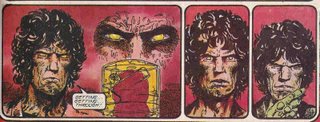 More importantly, we learn pretty quickly that Alpha is very much in touch with his inner rage. This was made pretty damned explicit about 7 years and 30 adventures later, when he spent 26 weeks in the epic 'Rage!' storyline. Even here, however, he never really loses his temper; more scarily, he always seems to know exactly what he's doing, even while he's whaling on some villain or other. I've always seen Johnny Alpha as a hero, someone to admire and emulate, although I wouldn't go into his line of work... But what about his disturbing tendency to destroy his enemies so utterly? It's not as if one can dismiss this as simple bestiality, as with a less interesting character like Wolverine (actually, Wolverine's pretty cool; shame he hasn't been in nearly as many entertaining stories as Alpha).
More importantly, we learn pretty quickly that Alpha is very much in touch with his inner rage. This was made pretty damned explicit about 7 years and 30 adventures later, when he spent 26 weeks in the epic 'Rage!' storyline. Even here, however, he never really loses his temper; more scarily, he always seems to know exactly what he's doing, even while he's whaling on some villain or other. I've always seen Johnny Alpha as a hero, someone to admire and emulate, although I wouldn't go into his line of work... But what about his disturbing tendency to destroy his enemies so utterly? It's not as if one can dismiss this as simple bestiality, as with a less interesting character like Wolverine (actually, Wolverine's pretty cool; shame he hasn't been in nearly as many entertaining stories as Alpha).
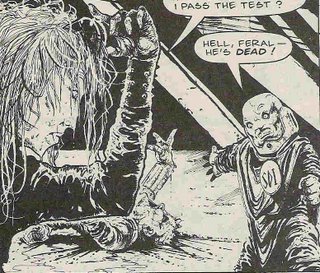 Alan Grant, who developed the series on his own in the late 80s, presumably made a similar connection when he created young new Strontium Dog 'Feral'. His mutation was never that obvious, beyond that he was kinda feral-looking. Anyway, he was a fan of Alpha's, and was set up as the new breed. He defended mutant rights, was brave, disrespectful, and good at akilling. But he was no hero - didn't have Alpha's hold on morality, see. Something it would take (cough, spoiler, cough) Alpha's death (cough) for him to realise. In some ways, he was 2000 AD's equivalent to the hot proto-image style characters flooding Marvel at about the same time (1990ish); cool design, lots of death and hot-headedness, poorly services by artists in later times (sorry, Mr Dobbyn; loved your Medivac 318, hated your Strontium Dogs...) Any, massive digression. But then, this is my blog, I don't have to make goddamn excuses. Screw you.
Alan Grant, who developed the series on his own in the late 80s, presumably made a similar connection when he created young new Strontium Dog 'Feral'. His mutation was never that obvious, beyond that he was kinda feral-looking. Anyway, he was a fan of Alpha's, and was set up as the new breed. He defended mutant rights, was brave, disrespectful, and good at akilling. But he was no hero - didn't have Alpha's hold on morality, see. Something it would take (cough, spoiler, cough) Alpha's death (cough) for him to realise. In some ways, he was 2000 AD's equivalent to the hot proto-image style characters flooding Marvel at about the same time (1990ish); cool design, lots of death and hot-headedness, poorly services by artists in later times (sorry, Mr Dobbyn; loved your Medivac 318, hated your Strontium Dogs...) Any, massive digression. But then, this is my blog, I don't have to make goddamn excuses. Screw you.
Back to the 'heroic anger' concept. Specifically, is it legitmate? To some extent one can appeal to the argument that the recipients of Alpha's rage are dirty scum who have it coming. Certainly the key 'power' of any classic comic book hero is the uncanny ability to always know who is evil and worth fighting - but then don't heroes also work within the remit of 'thou shalt not maim horribly, let alone kill'? Not in the 2000 ADverse. But still, all of Alpha's victim's have felt justifiable, in a way that ever third Dredd story (or so), shows him, or at least the law he serves, being way unjust.
2000 AD is of course famous for its 'anti-heroes', which as far as I can tell is a fairly loose way of describing people who basically do good, but usually only for some reward (e.g. financial), and who aren't averse to a bit of excess violence and treading on the little people along the way. Alpha is a step above this rather cynical definition, on the grounds that he dares to take on bounty jobs that others wouldn't. He'll go for the truly evil, and for people who could kill him all too easily. Sure, he gets a high bounty (not that he ever gets to spend it...), but the risks are high. More overt heroism is evident in the many tales in which he ends up working for free; or at least, taking on work beyond the terms of the bounty, often to help some poor mutie.I'm not sure I'm going anywhere with this post. Really, I was looking for an excuse to show Alpha being mean. And when he really wants to get into it, he doesn't need his measly number four cartridge - it's time to bring out the electronux - the single coolest weapon in the whole 2000 ADverse:
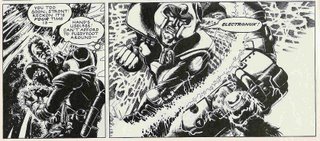
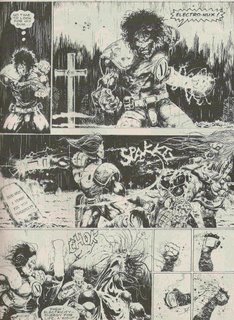

Where do you begin if not at Alpha?
 Judge Dredd may be the most famous character to come out of 2000 AD, but ask any remotely longtime reader who their favourite character is, and the name 'Johnny Alpha: Strontium Dog' will never be far away. He hasn't had as many stories as Dredd, but then he's also had far fewer bad ones - you'd be hard pressed to think of a single Strontium Dog tale that is universally derided.
Judge Dredd may be the most famous character to come out of 2000 AD, but ask any remotely longtime reader who their favourite character is, and the name 'Johnny Alpha: Strontium Dog' will never be far away. He hasn't had as many stories as Dredd, but then he's also had far fewer bad ones - you'd be hard pressed to think of a single Strontium Dog tale that is universally derided.
Of course, Alpha was created by the same team responsible for Judge Dredd, the mighty Wagner/Ezquerra combo, again with a lot of developmental help from Alan Grant, who also co-wrote many a Dredd tale. Where Dredd is loosely based on Dirty Harry, I like to think that Alpha is loosely based on that other Eastwood perennial, 'the man with no name'. You could even stretch the analogy by pointing to the films of Sergio Leone, with their famous close-ups on people's eyes as they size up their opponents. Johnny Alpha is all about the eyes.
 He's also been in more than one western-style adventure. 'Incident on Mayger Minor' being the most obvious, although as if to disprove my theory, that's a clear pastiche of the film Shane, not an Eastwood movie. Oh, well. Still, there are a lot of Alpha tales set on frontier towns in frontier worlds, where death is only a quick-draw away.
He's also been in more than one western-style adventure. 'Incident on Mayger Minor' being the most obvious, although as if to disprove my theory, that's a clear pastiche of the film Shane, not an Eastwood movie. Oh, well. Still, there are a lot of Alpha tales set on frontier towns in frontier worlds, where death is only a quick-draw away.
Anyway, what's so special about Alpha? Well, for one thing, he's unambiguously a hero, in a way that Dredd is only a hero when Mega City 1 is threatened. Heroism can be easily to mock, but I love heroes, and it's pretty clear that many (most?) other comics readers do, too. Obviously being a 2000 AD kind of hero, Alpha isn't afraid to kill people. Often with extreme prejudice (no, I don't know what that phrase means, either).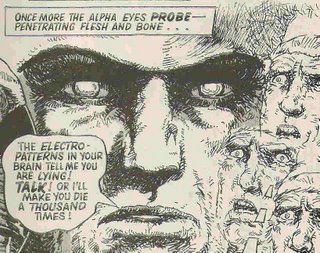 OK, so maybe that doesn't look so heroic, but then Alpha all too rarely encounters people who don't deserve to die. My, that was a clumsy sentence. The point is, the Strontium Dog Universe is a strange mix of complete bastards, race hate criminals, and close-knit, kindly families. Alpha has no difficulty in telling the difference, and dispatching those who are on the wrong side.
OK, so maybe that doesn't look so heroic, but then Alpha all too rarely encounters people who don't deserve to die. My, that was a clumsy sentence. The point is, the Strontium Dog Universe is a strange mix of complete bastards, race hate criminals, and close-knit, kindly families. Alpha has no difficulty in telling the difference, and dispatching those who are on the wrong side.
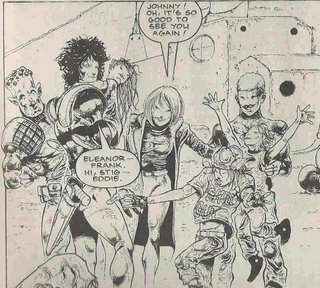 See - as well as killing, Alpha loves his families. He's a good man, even in the slightly bizarre-looking Simon Harrison era.
See - as well as killing, Alpha loves his families. He's a good man, even in the slightly bizarre-looking Simon Harrison era.
The story behind Strontium Dog is mutation. Unlike the mostly benign mutant X gene in the Marvel Universe, 2000 AD mutations are mostly physical, often unpleasant, and always faintly hilarious. If large numbers of these kind of people existed, they would surely have a horrible life, and would be hounded by 'norms' wherever they went. It's a cruel world. Many a Strontium Dog tale begins and ends with Alpha having to cope with taunts from norms who harass him as he goes about his work. 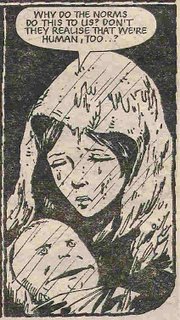 You'd think all this worthiness would get wearing, but somehow it doesn't. I found this panel rather poignant, in exactly the way that a similar panel in a Pat Mills story would have me rolling my eyes.
You'd think all this worthiness would get wearing, but somehow it doesn't. I found this panel rather poignant, in exactly the way that a similar panel in a Pat Mills story would have me rolling my eyes.
Next, heroic anger.
The new Dead Man
I was going to post something about ultra-violence, but I've just come home and found the latest Prog. I had to turn straight to the final epsidode of Malone, and by the end there was almost a tear in my eye. I don't mean 'almost' as a slight to the creators involved - it's just that 'almost crying' is as close as I get to the real thing these days. It's a rare treat when 2000 AD serves up a poignant moment. Not something that can be legislated for by Tharg, it just happens every now and then with a long term character. Even then, it's a rarity, as so many characters are humour-based, and not disposed to this kind of thing. So it's a minor miracle the Abnett has pulled off, as Sinister Dexter was a full-on comedy strip if ever 2000 AD had one.Just for fun, let's try to round up any other poignant moments the comic has had:Obviously, Strontium Dog has featured two pretty prominent deaths, and both count
It's a rare treat when 2000 AD serves up a poignant moment. Not something that can be legislated for by Tharg, it just happens every now and then with a long term character. Even then, it's a rarity, as so many characters are humour-based, and not disposed to this kind of thing. So it's a minor miracle the Abnett has pulled off, as Sinister Dexter was a full-on comedy strip if ever 2000 AD had one.Just for fun, let's try to round up any other poignant moments the comic has had:Obviously, Strontium Dog has featured two pretty prominent deaths, and both count
Dexter's actual death a few months agoDredd's had several here and there; even Garth Ennis managed one with the death of Dekker
Anderson's had at least one - I'm thinking 'The Jesus Syndrome'
Nikolai Dante has found several along the way, and that's without the need to kill people; there might be another one along anytime soon...Halo Jones Book 3, yes?Even if I had scanned in the relevant panels, I probably wouldn't here as that would be to denigrate the moment (even in rereads). I don't even have a handy batch of pics of Ray Dexter in action, more's the pity. But here's one of Sinister back from the late 90s, when he starts to get the impression that death is staring him in the face...


Future Shock!
 The twist you didn't see coming. The crazy idea that would never have occurred to you. The bizarre juxtaposition of images. The Future Shock is meant to be all these things, and sometimes more (Moore?). As part of the anthology that is 2000 AD, the one (or very occasionally two) off stories that are thrown into the anthology mix can feel like filler material. They are tolerated by the readers because a) they are occasionally very entertaining b) they can be read in one go, meaning no waiting till next week to get some kind of resolution c) virtually every reader thinks: "one day, I can have a story printed in 2000 AD". I'm not sure if it was always the intention that 'Tharg's Future Shocks' would be an avenue for unproven writers and artists, but that's certainly what they are now. As many successful writers say in interviews, these short stories with twists can be the hardest things to write, and they appreciate having to go through the process of crafting a future shock every now and then.Of course, the essence of 'future shock' is not limited to these one-offs. Many a 2000 AD tale has tried to win favour by featuring twists, surprises and general weirdness. Along with anti-heroes and high bodycount, I have the notion that 'future shock' is one of the key features of 2000 AD, and a good story should have this feel to it, be it Judge Dredd, Sinister Dexter or Nikolai Dante or whatever.
The twist you didn't see coming. The crazy idea that would never have occurred to you. The bizarre juxtaposition of images. The Future Shock is meant to be all these things, and sometimes more (Moore?). As part of the anthology that is 2000 AD, the one (or very occasionally two) off stories that are thrown into the anthology mix can feel like filler material. They are tolerated by the readers because a) they are occasionally very entertaining b) they can be read in one go, meaning no waiting till next week to get some kind of resolution c) virtually every reader thinks: "one day, I can have a story printed in 2000 AD". I'm not sure if it was always the intention that 'Tharg's Future Shocks' would be an avenue for unproven writers and artists, but that's certainly what they are now. As many successful writers say in interviews, these short stories with twists can be the hardest things to write, and they appreciate having to go through the process of crafting a future shock every now and then.Of course, the essence of 'future shock' is not limited to these one-offs. Many a 2000 AD tale has tried to win favour by featuring twists, surprises and general weirdness. Along with anti-heroes and high bodycount, I have the notion that 'future shock' is one of the key features of 2000 AD, and a good story should have this feel to it, be it Judge Dredd, Sinister Dexter or Nikolai Dante or whatever.
Finding clever twists and surprises seems to be a feature of writing in general, and perhaps genre writing in particular. A good writer manages to present a story where the reader can't guess what is going to happen, but ensuring that all surprises make sense. Even in non-fiction, high minded academics presumably feel good about themselves when they put forward an idea about their topic that appears off-beat, yet chimes with the facts. There's no difference between Richard Dawkins talking about memes as units of transferable cultural concepts that are slowly shaping human society, and a budding Future Shock writer saying "and then she opens up her face, and she's a robot..!" Get Kevin O'Neill to illustrate either, and you'd have a decent but not spectacular 2000 AD strip.2000 AD doesn't just have twists; it also aspires to have outrageous ideas along with or instead of those twists. The plot taking an unexpected turn, or a character turning out not to be who (or what) you thought they were is one way of creating surprise. But so is chucking some leftfield hoo-hah into the mix. 2000 AD affords a certain advantage to writers trying the weirdness-twist tack. It's a weird comic. There are very limited rules about what readers would find acceptable, so outlandish ideas won't seem contrived, but rather are expected. As long as your idea is odd enough that no-one could see it coming, it doesn't matter that they were trying ever-so-hard to see something coming. You could just chuck in a comedy panel of a man turning into a worm for a laugh...

Future Shock doesn't always succeed, either in the one-offs or the longer strips , and some surprises are as old as the hills (anyone remember the 'shocking' twist to Sancho Panzer?). Doesn't matter if you've got some tidy art to back it up, though. And one should never forget that old Stan Lee / Jim Shooterism - every comic is someone's first. Just because a good idea can become a cliche quickly doesn't mean you can't use it from time to time. Hell if I'd seen either of these panels 20 years ago, i'd have been impressed:
 (The old 'am I human am I an alien' uncertainty)
(The old 'am I human am I an alien' uncertainty)
 (The old 'science experiment goes wrong, everyone will soon die' catastrophe)
(The old 'science experiment goes wrong, everyone will soon die' catastrophe)
 (Despite his carefully worded wish, rest assured that he gets burned)
(Despite his carefully worded wish, rest assured that he gets burned) One of the best cliches that never really gets old is death. 2000 AD has a healthy relationship with killing off its characters (and not resurrecting them, on the whole). So you just know that any minor characters could go at any moment. Makes for some fun action scenes. And if you mix up the dialogue with a bit of Brit slang or simple nastiness, instant 2000 AD.
One of the best cliches that never really gets old is death. 2000 AD has a healthy relationship with killing off its characters (and not resurrecting them, on the whole). So you just know that any minor characters could go at any moment. Makes for some fun action scenes. And if you mix up the dialogue with a bit of Brit slang or simple nastiness, instant 2000 AD.
Future Shock, it's the business. Got that?


Aliens, Robots, and Dredd
 I don't know if 2000 AD has ever had a brief for what to include in each Prog, but if it did, I expect it would involve these three staples. The comic may set itself apart from others with its black humour and relentless killings, but it has always been, and continues to be, an unashamed genre comic. And when that genre is Science Fiction, you're gonna get some goddamn robots and aliens. And just occasionally, you're gonna get humans who turn out to be aliens, robots and even alien robots.
I don't know if 2000 AD has ever had a brief for what to include in each Prog, but if it did, I expect it would involve these three staples. The comic may set itself apart from others with its black humour and relentless killings, but it has always been, and continues to be, an unashamed genre comic. And when that genre is Science Fiction, you're gonna get some goddamn robots and aliens. And just occasionally, you're gonna get humans who turn out to be aliens, robots and even alien robots.

Others have tried to feature Dredd-like characters (Jerry Ordway's US Agent, anyone?),
but he reamins a uniquely 2000 AD creation. Dredd stories feature aliens and robots from time to time. He's not a fan*.
In 30 years of weekly Progs, 2000 AD has had a go at pretty much any kind of robot/alien concept you might care to name. Frankly, it's not always about originality - a good writer can get a lot of mileage from a simple idea. Like Alan Moore's Skizz, a simple 'friendly alien comes to Earth' story. The E.T.-like plot was elevated partly because Moore chose to set it against a backdrop of a very British working class locale, and partly because he had a genuinely unusual and alien conception for his central character. Look, the story is so compelling, you can have a whole page without picturing the protagonist in it, and its one of the best pages in the strip: (OK, so the irony is heavy-handed, but still, it's a powerful piece of teen drama)As for robots, the theme still not done to death is surely that of programmable humanoid devices that have dictinct personalities, and ultimately experience the human condition. 2000 AD writers seem to go to ways with this. On the one hand, you have Pat Mills, whose Ro-Busters are downtrodden and put upon slaves who are aching to be treated as equals.
(OK, so the irony is heavy-handed, but still, it's a powerful piece of teen drama)As for robots, the theme still not done to death is surely that of programmable humanoid devices that have dictinct personalities, and ultimately experience the human condition. 2000 AD writers seem to go to ways with this. On the one hand, you have Pat Mills, whose Ro-Busters are downtrodden and put upon slaves who are aching to be treated as equals.
 On the other hand, you have John Wagner (and Alan Grant), whose robots tend to show human personality problems taken to curious extremes. I'd love to read a Robo-Hunter story in which we meet the scientists who programmed the crazy droids that inhabit this universe:
On the other hand, you have John Wagner (and Alan Grant), whose robots tend to show human personality problems taken to curious extremes. I'd love to read a Robo-Hunter story in which we meet the scientists who programmed the crazy droids that inhabit this universe:
 Yes, these are robots. Yes, these are mobsters.
Yes, these are robots. Yes, these are mobsters.  And yes, they fulfil their brief right down to the need to wax poetical about their dirty work. Hey, I'm sure real mafioso don't do it, but it feels like they should. Expressionism, no?And how about Molotov, leader of the Amalgamated Androids Union. He's got a beef, and he won't let up. Plus, you can just tell that he's programmed to be a Union droid first, and a cocktail mixer second.
And yes, they fulfil their brief right down to the need to wax poetical about their dirty work. Hey, I'm sure real mafioso don't do it, but it feels like they should. Expressionism, no?And how about Molotov, leader of the Amalgamated Androids Union. He's got a beef, and he won't let up. Plus, you can just tell that he's programmed to be a Union droid first, and a cocktail mixer second.
And what about that third 2000 AD staple - Judge Dredd? I'm sure reams have been written about the character (although not nearly enough), and the fact remains that he is by far the most exciting and enduring character to come out of 2000 AD. Other strips have been more fun from time to time, but none seems to have such an inexhaustible supply of funny, tragic, philosophical, political, and above all satirical stories to tell. John Wagner, Carlos Ezquerra (and of course Pat mills), we salute you! Are you listening, people?


*Unless you're kindly alien Tweak, who was created by Pat Mills and therefore doesn't quite count.
Borag Thungg my fellow Earthlets

OK, Tharg, message received and understood... It's time to talk 2000 A.D. - the comic, that is, not the year. This is no mere nostalgia blog! Oh, wait, yes it is. Over the last year my long-running obsession with the galaxy's greatest comic has been reinvigorated, and I need to share it with the internetosphere. 30 years of anti-heroes, violence and black homour to wallow in - what could be more fun? So, armed with a complete set of back progs and a scanning device*, it falls to me to honour (on a semi-regular basis) what millions in Britain but only scant thousands around the world know to be the ultimate in sequential picto-fiction** entertainment. Strap yourselves in, and let's start exploring...

Of course, the best thing about 2000 AD is that it's an anthology. It's had and sadly continues to have it's fair share of frankly laughable strips, but I've never read a prog that was all bad. Of course a prog that's all amazing is equally rare, but it's a special treat when they come around - and they do, often a few times in a single year. That's not to say I won't bring out the mockery when it's called for. Yes, Wolfie Smith, I'm looking at you.
...
plenty more where that came from. But let's get straight to the heart of the matter. 2000 AD reaches the parts that other comics didn't know existed. Sure, it's got it's own stable of enduring characters, dependable writers, and an army of hyper-talented artists (none of that penciller-inker whatnot). But plenty of comics have those. There are even many fine purveyors of sardonic one-liners and twsit-endings to astonish and amuse.
But where else can you find stuff like this?
 Or this?
Or this?
 Or this?
Or this?
 Or this?
Or this?

2000 AD has this kind of mind-expanding craziness going on all the time. Wit, inventiveness, philosophy, body count (oh yes - the bodycount. Legendary enough to fill a theme week at some point, and that's covering the years before Mark Millar became a regular writer) All this, and every seven days!!!Before I sign off this first rapture, another small and strangely unique joy of serial anthology comics - the 'next' caption. As if a cliffhanger ending wasn't enough, most strips in 2000 AD like to end with a teaser for the next episode. And by 'teaser', I mean a short sentence, often some kind of pun. Yay, puns. Lately these 'next' captions have become a little stale, but I love them, and will post them to my heart's content. No guarantee that what I post next will have any relevance to the 'next' caption, though!
 * OK, so you may have noticed that I'm pretty rubbish at scanning, cropping and all that jazz. When I'm asked the question at job interviews "what would you say are your weaknesses", I definitely don't reply "Sometimes I'm too much of a perfectionist". I'll try to make up for it with robust spelling and grammar. He said setting himself up for a fall...** not to be confused with William Gaines' not-quite-comics experiment of the 1950s
* OK, so you may have noticed that I'm pretty rubbish at scanning, cropping and all that jazz. When I'm asked the question at job interviews "what would you say are your weaknesses", I definitely don't reply "Sometimes I'm too much of a perfectionist". I'll try to make up for it with robust spelling and grammar. He said setting himself up for a fall...** not to be confused with William Gaines' not-quite-comics experiment of the 1950s



 Alan Grant, who developed the series on his own in the late 80s, presumably made a similar connection when he created young new Strontium Dog 'Feral'. His mutation was never that obvious, beyond that he was kinda feral-looking. Anyway, he was a fan of Alpha's, and was set up as the new breed. He defended mutant rights, was brave, disrespectful, and good at akilling. But he was no hero - didn't have Alpha's hold on morality, see. Something it would take (cough, spoiler, cough) Alpha's death (cough) for him to realise. In some ways, he was 2000 AD's equivalent to the hot proto-image style characters flooding Marvel at about the same time (1990ish); cool design, lots of death and hot-headedness, poorly services by artists in later times (sorry, Mr Dobbyn; loved your Medivac 318, hated your Strontium Dogs...) Any, massive digression. But then, this is my blog, I don't have to make goddamn excuses. Screw you.
Alan Grant, who developed the series on his own in the late 80s, presumably made a similar connection when he created young new Strontium Dog 'Feral'. His mutation was never that obvious, beyond that he was kinda feral-looking. Anyway, he was a fan of Alpha's, and was set up as the new breed. He defended mutant rights, was brave, disrespectful, and good at akilling. But he was no hero - didn't have Alpha's hold on morality, see. Something it would take (cough, spoiler, cough) Alpha's death (cough) for him to realise. In some ways, he was 2000 AD's equivalent to the hot proto-image style characters flooding Marvel at about the same time (1990ish); cool design, lots of death and hot-headedness, poorly services by artists in later times (sorry, Mr Dobbyn; loved your Medivac 318, hated your Strontium Dogs...) Any, massive digression. But then, this is my blog, I don't have to make goddamn excuses. Screw you.




































